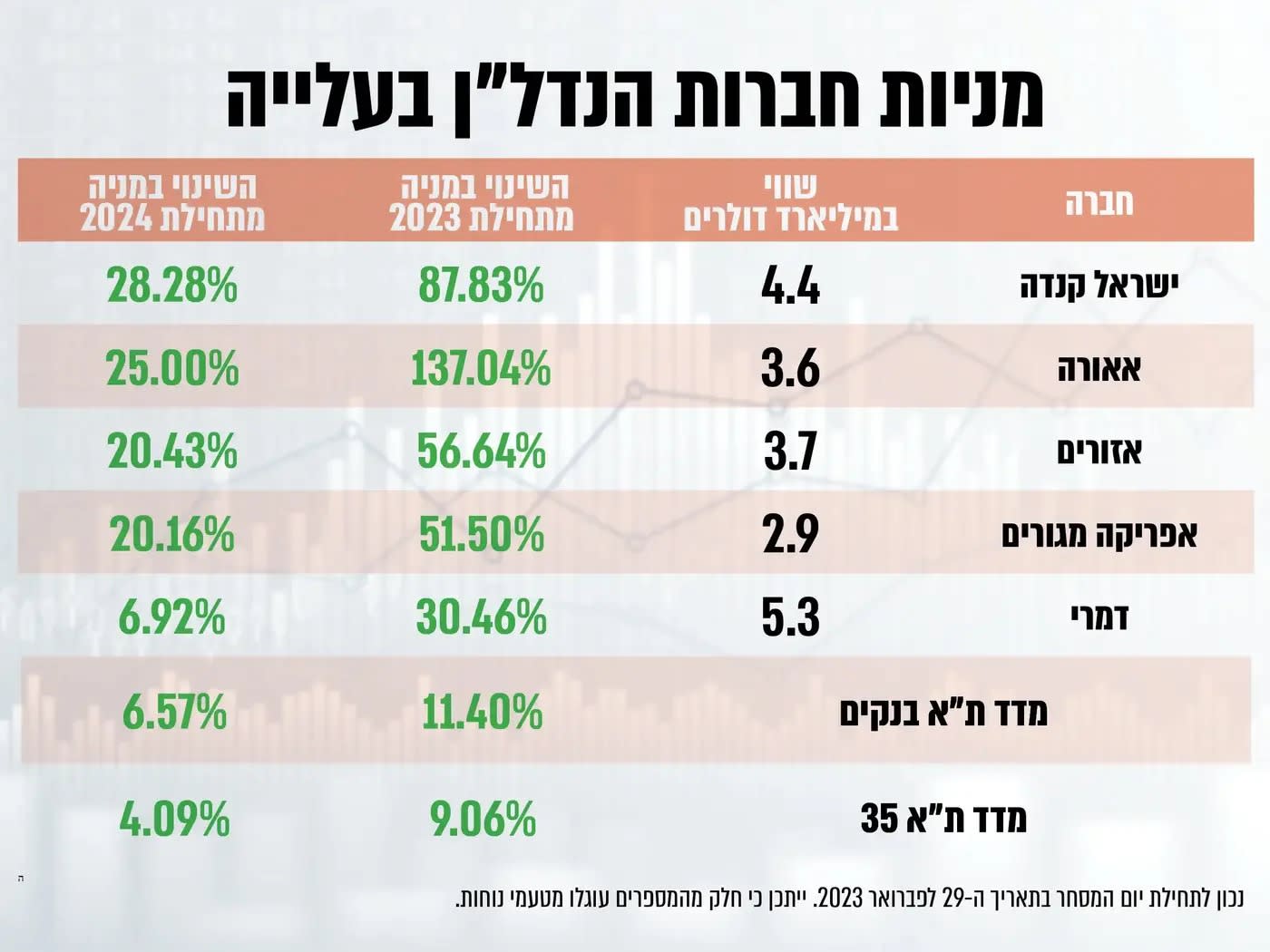Real estate companies are turning the war's "lemons," which led to a reduction in supply, into "lemonade," driving the sector's stocks to soar.
All this is happening after a year and a half of uncertainty due to rising interest rates, alongside the war with Hamas. However, investors see the horizon of the war's end coming with a construction boom in the Gaza border region alongside a sharp rise in prices. This has led the stocks of the five leading residential real estate companies on the Tel Aviv Stock Exchange to an average increase of about 73% since the beginning of 2023, and about 20% since the beginning of the year.
Residential real estate stocks jumped higher than the Real Estate Index itself, which also includes other real estate companies, infrastructure companies, and companies engaged in other areas such as energy (housing and construction). The Index rose by about 8.8% since the beginning of 2023, and by about 0.48% since the beginning of the year – even lower than the main indices such as TA Real Estate 90 Index, which rose by about 11.4% since the beginning of 2023 and by about 6.6% since the beginning of the year, and TA-125 index rose by about 9% and 4% for those periods respectively.
Among the residential real estate stocks, it was the stock of Aura Company that led with an increase of about 137% since the beginning of 2023, while Demari's stock closed with an increase of about 30.5% for the same period.

Since the beginning of 2024, the stock of Israel Canada leads with an increase of about 28.3%, compared to Demari, which closed this period with an increase of about 7%.
Raz Domb, a real estate analyst at Leader Capital Markets, explained: "The factors that led investors away from the stocks of real estate companies were also those that in recent months brought some of them back.
"The companies indeed closed the year 2023 with a deal-closing rate of about 40% as a result of the interest rate increase trend during the last year and a half, alongside Israel's entry into war and fighting in the North. However, the beginning of discussions about lowering the interest rate plus its actual reduction in January, together with the understanding that the supply will decrease in the near future compared to the demand that continues to be relatively rigid, led investors back.
"There has always been a shortage of apartments, but the war led to a severe shortage of workers in the sector, which is expected to affect the companies' performance ability for the coming years, that is: less supply. Added to this is the increase in interest rates that led contractors to stay away from new tenders for land, and to delay the start of existing projects.
"The shortage, if it continues, could lead to support for rising housing prices, as the demand for them remains relatively rigid. This is due to the population growth rate, which stands at about 2% per year, to which is added the expectation of a massive exodus as a result of the judicial reform, alongside a wave of Israelis returning, some of whom may purchase apartments, and a possible wave of immigration as a result of the war."
The latter factor also led to a higher demand for apartments with a safe room, which are mainly new apartments as opposed to second-hand apartments. Although there are not yet enough purchase transactions to indicate a definite shift to new apartments over second-hand ones, if we use the rental market as a model to examine public tastes, then the gaps in demand for renting new apartments and second-hand with a safe room, compared to those without, are notable.

The companies themselves also feel encouraged by a certain awakening that they are beginning to feel in the market, with more lively movement in the sales offices compared to the past year, and it is likely that this will be reflected as early as the second half of 2024 and the beginning of 2025.
Domb explains that "It can be estimated that the market is correcting the pricing erosion of the sector stocks that the judicial reform caused, and in our view, at Leader Capital Markets, it is also pricing in the absence of an escalation into war in the northern sector, which as it develops will have a significant impact on the sector's stocks."
Regarding the differences between the companies, Domb says, "The increase presented in the table concerning Aura Company can be attributed to its recent marketing of itself as the 'spearhead' of the urban renewal field in the stock market, and investors love this because in a market where interest rates are high, there is an advantage for a company whose activity is not dependent on capital-intensive land tenders, and the market gives it a premium for this.
In contrast, Demari's stock, which was more defensive due to the company's ownership of historic lands without significant construction costs, reacts with more moderate increases. This is mainly due to the absorption of lower decreases than the rest of the companies traded in the sector during the preceding period.
One of the companies worth mentioning is Israel Canada, which demonstrated high marketing capabilities and presented nothing less than phenomenal sales numbers, mainly in its projects in Sde Dov in Tel Aviv and its Midtown project in Jerusalem.
The company sold over 100 apartments at prices that stood at about NIA 60,000-70,000 per square meter, at a time when the market showed a freeze in new transactions. And as a result, the company gained a premium from the investors.
And what about the future?
"The assumption is that we will continue to see an increase in the number of transactions during the second half of 2024 and the beginning of 2025, assuming that no significant northern front will develop, and assuming that the trend of decreasing interest rates will continue," Domb says.
"The estimates also foresee increased construction in the various southern regions, as if the war in Gaza yields positive results and security for the residents of the area, it would lead to significant demand in these regions, which are cheaper than the central areas, which are challenging for young couples to buy apartments in," Domb concludes.
